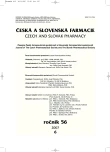-
Medical journals
- Career
A study of the properties of tablets from coprocessed dry binders composed of α-lactose monohydrate and different types of cellulose
Authors: J. Mužíková; J. Zvolánková
Authors‘ workplace: Hradec Králové, Czech Republic ; Department of Pharmaceutical Technology, Charles University in Prague, Faculty of Pharmacy in
Published in: Čes. slov. Farm., 2007; 56, 269-275
Category: Original Articles
Overview
The paper evaluates the differences between the properties of tablets from two coprocessed dry binders based on α-lactose monohydrate and cellulose, MicroceLac®100 and Cellactose®80. The substances differ in the type of contained cellulose; MicroceLac®100 contains 25% of microcrystalline cellulose, Cellactose®80, 25% of powdered cellulose. The properties under study included the tensile strength and disintegration time in dependence on compression force, addition of two concentrations of the lubricant sodium stearylfumarate (Pruv) and a 50% addition of the active ingredients ascorbic acid and acetylsalicylic acid. Using one of the compression forces, the effect of Pruv and magnesium stearate on the above-mentioned properties were compared. In the compression forces of 6 and 8 kN the strength of the compacts from pure Cellactose®80 was lower than that of those from MicroceLac®100 both without and with the lubricant. The lubricant sensitivity of dry binders depended on compression force. Pruv decreased the strength of compacts less than magnesium stearate. The tablets from Cellactose®80 possessed a longer disintegration time than those from MicroceLac®100, excepting the tableting materials containing 0.4 Pruv with a compression force of 6 kN. Disintegration time was prolonged with the use of sodium stearylfumarate and it was increased with compression force much more markedly in the case of Cellactose®80. In the presence of ascorbic acid, the strength of tablets was decreased in the case of both dry binders, but it was higher with MicroceLac100, disintegration time was very short and independent of the type of the dry binder. In the case of acetylsalicylic acid, the strength of tablets was higher with a lesser influence of the type of the dry binder, and disintegration time was longer and especially in the case of Cellactose®80 increased with increasing concentration of Pruv.
Key words:
MicroceLac®100 – Cellactose®80 – sodium stearyl fumarate – magnesium stearate – ascorbic acid – acetylsalicylic acid – tensile strength of tablets – disintegration time of tablets
Labels
Pharmacy Clinical pharmacology
Article was published inCzech and Slovak Pharmacy

2007 Issue 6-
All articles in this issue
- Oxycellulose – a cellulose derivative with a potential to become an active pharmaceutical substance as well as an auxiliary substance
- Physiology and pharmacology of hyaluronic acid
- A study of the properties of tablets from coprocessed dry binders composed of α-lactose monohydrate and different types of cellulose
- Experience with ciclesonide in patients with mild persistent bronchial asthma
- Flavonoid accumulation in Scutellaria baicalensis Georgii in vitro cultures upon treatment with sodium cinnamate
- Evaluation of mechanical strength of tablets from microcrystalline cellulose by means of energetic parameters
- EXPERTA – the first company specializing in scientific evaluation of medicaments
- Czech and Slovak Pharmacy
- Journal archive
- Current issue
- Online only
- About the journal
Most read in this issue- Experience with ciclesonide in patients with mild persistent bronchial asthma
- Physiology and pharmacology of hyaluronic acid
- Oxycellulose – a cellulose derivative with a potential to become an active pharmaceutical substance as well as an auxiliary substance
- A study of the properties of tablets from coprocessed dry binders composed of α-lactose monohydrate and different types of cellulose
Login#ADS_BOTTOM_SCRIPTS#Forgotten passwordEnter the email address that you registered with. We will send you instructions on how to set a new password.
- Career

